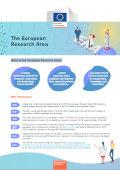What is ERA?
The European Research Area (ERA) is the ambition to create a single, borderless market for research, innovation and technology across the EU.
By strongly aligning their research policies and programmes, European countries become more effective on the research sector. The ERA is based on excellence and
- prioritises investments and reforms in research and innovation
- boosts market uptake
- strengthens mobility of researchers and free flow of knowledge and technology
- improves access to excellence
The ERA policy framework is based on
- the ERA governance, including the ERA Forum, ERAC and the Council;
- the Pact for Research and Innovation in Europe;
- an ERA Policy Agenda with concrete actions.
ERA in the regions
Regions and cities will be supported in promoting science and research locally through the Knowledge Exchange Platform, relaunched as KEP 2.0.
Recommendations to EU countries
To make the European Research Area stronger, national research and innovation policies need to be strengthened too.
Since 2010, the European Semester has been providing EU countries with recommendations, to coordinate and improve social and economic policies across the EU.
Research and innovation policy recommendations are embedded in this process.
It is a clear example of how cooperation and dialogue between the Commission and EU countries leads to better and more impactful policies.
ERA progress reports
ERA progress reports summarise the state of play of ERA and progress made on its implementation by EU and associated countries.
ERA Act
The European Commission intends to adopt the European Research Area (ERA) Act in 2026, as announced in the Competitiveness Compass for the EU.
The initiative responds to persistent challenges in the EU’s research and innovation (R&I) ecosystem, including fragmented regulatory frameworks, uneven R&D investment, and barriers to knowledge sharing. It builds on the achievements of the renewed ERA since 2021, particularly the progress made through the ERA Policy Agendas.
More information on European Research Area (ERA) Act.
Documents

- Factsheet
- 24 January 2024
What is the European Research Area?
A single, borderless market for research, innovation and technology across the EU, where countries come together and improve their research policies and systems and where there is free movement of researchers, knowledge and innovation.
Latest
- Press release
Today, the European Commission adopted the main Horizon Europe work programme for 2026-2027, a €14 billion investment designed to drive research and innovation (R&I) across the EU's strategic goals.
- 1 min read
- News article
Research and innovation news alert: For the first time, the Commissioner pledged to embed research security into law, including it in the Commission’s forthcoming European Research Area Act proposal.
- 2 min read
Events

- Conferences and summits
- Wednesday 10 December 2025, 22:00 - Friday 12 December 2025, 16:30 (CET)

- Conferences and summits
- Thursday 13 November 2025, 09:30 - 15:30 (CET)
- Brussels, Belgium
- Live streaming available

- Training and workshops
- Wednesday 8 October 2025, 09:00 - 13:30 (CEST)
- Online only
- External event
